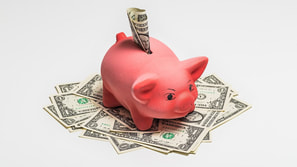 While we all may be familiar with the cliché that “money can’t buy happiness,” many of us still have our doubts. In a culture that promotes capital, profit and productivity, the notion that “less is more” may a bit hard to get one’s mind around. Let’s look at what the research says: A series of nine experiments found that priming people to think about money leads to a more self-sufficient orientation in which people are less likely to request help and help others (Vohs et al 2006). Reminders of money were also found to cause people to want to work and play alone, and physically distance themselves from a new acquaintance to a greater degree than those not prompted to think about money. Simply making people feel more wealthy (regardless of actual income) by having them compare themselves to others worse off was found to lead to more selfish, unethical choices and greedy behavior (Piff et al 2012). Classic studies have shown that, even when people acquire surplus material possessions or extreme wealth such as through the winnings of a lottery, they are no more likely to experience happiness than they were prior to their acquisitions (Brickman et al 1978). The tendency has been labeled the hedonic treadmill, noting how the more you accumulate (money or otherwise), the more you end up desiring. This results in an ever-increasing treadmill pace towards the carrot of happiness (Brickman and Campbell 1971; Eysenck 1990).  What draws us toward accumulation? Studies have demonstrated a relationship between self-esteem and the desire to self-enhance through the accumulation of material possessions (Park and John 2010). Consumer goods have been found to function as a compensatory salve that reduces the distress caused by the gap between how one perceives oneself and how one desires to view oneself (Mandel et al 2014). Uncertainty and self-doubt have also been linked to materialism (Change and Arkin 2002), as has narcissism (Cisek et al 2014).  Pause and … Give Selfishness may not be our first instinct. Results from a series of ten experiments show that people who deliberate longer about how much to contribute, give less than those who decide quickly. Selfishness appears, thus, to be a function of mulling over the decision, whereas the intuitive gut response tends to be one of more generosity (Rand et al 2012). Automatic, intuitive processes, as opposed to deliberative decision making, were also found to be associated with occurrences of high-stakes altruism in which individuals risked their lives to save others (Rand and Epstein 2014). Becoming less materialistic predicts improvements in well-being (Kasser et al 2014). Having less has also been found to correlate with giving more (Piff et al 2010), reminding us perhaps that we all have access to a wealth of generosity. *** Read about Dariel Garner, a multimillionaire who chose fifteen years ago to give up his position within the top 100 wealthiest Americans to be at the bottom one percent financially. He lives in New Mexico, works in social activism and reports now living a much richer life. https://www.positive.news/2018/perspective/31937/the-multimillionaire-who-gave-his-fortune-away/ Comments are closed.
|
AuthorK.Gustin, Ph.D. Archives
September 2021
Categories |
Photos from dvanzuijlekom, kevin dooley, Rawpixel Ltd, Jaykhuang, Marco Verch, IQRemix, Pest15, jenni from the block, www.cemillerphotography.com, Pierre PRESTAT, UNMEER, shixart1985 (CC BY 2.0), Benedikt Lang, biernackip, Ryan Dickey, Gamma Man, sgamble48, quinet, Günter Hentschel, tedeytan, nicolas.boullosa, Andreas Brandell Photography, Feed My Starving Children (FMSC), Dick Thompson Sandian, steve p2008, Ministère du Travail, de l'Emploi et de la santé, varmarohit, keepitsurreal, marcoverch, USEmbassyPhnomPenh, seattleanimal, hillels, sustainablejill, audi_insperation, benagain_photos, markus119, u07ch, Ale Art, pockethifi, milomingo, SchuminWeb, Vladimir-Morozov, Pablo F. J., Aardwolf6886, arundel and brighton, barnimages.com, krossbow, travelourplanet.com, Pictures by Ann, symphony of love, Shadowgate, Becky Matsubara, Martin Hesketh, David Paul Ohmer, maf04, KellyMercer, Sue90ca MORE OFF THAN ON, Günter Hentschel, Montclair Film, Carol (vanhookc), wuestenigel, paologmb, quinn.anya, marcoverch, Sarah Skiold-Hanlin, Jon_Callow_Images, Yahoo Inc, gregarch2, USFWS Mountain Prairie, CityofStPete, Theo Crazzolara, cafecredit, OIST (Okinawa Institute of Science and Technology), poptech, Free For Commercial Use (FFC), Phil Roeder, PragmaticFix, Phuketian.S, fabola, Chilanga Cement, BiblioArchives / LibraryArchives, GerryT, San José Public Library, EU Civil Protection and Humanitarian Aid Operation, COD Newsroom, {Guerrilla Futures | Jason Tester}, snkoigi, Tony Webster, focusonmore.com, fred_fiii, francisco_osorio, JovenesPosLAC, shixart1985, dsearls, 4nitsirk, IISG, AFL-CIO Field, Free Public Domain Illustrations by rawpixel, SortedForYa, Keith Allison, amira_a, Anne Worner, verchmarco, Toolstotal, Tuerkis Doerky, Thomas Naas Photography, Stiller Beobachter, josve05a_at_Wikimedia, Kenneth@Vetter, paologmb, markus spiske, chrisjtse, byzantiumbooks


 RSS Feed
RSS Feed